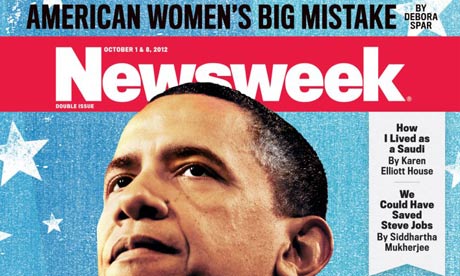Media Matters
Four years ago, Newsweek proclaimed „the end of conservatism.” Newsweek announced this week that it would reach its end as a print publication on New Year’s Eve. Don’t expect conservatives to break into „Auld Lang Syne.”
Henry Hazlitt, whose „Business Tides” column graced Newsweek’s pages from 1946 to 1966, got an early bead on the magazine’s downward spiral when the Graham family publishing tycoons purchased the magazine in the early sixties. The Economics in One Lesson author didn’t exactly predict his employer would spike the biggest sex scandal in American political history or run a demeaning cover photo of a conservative woman in running shorts. But when Newsweek axed Hazlitt after writing articles that had run afoul of the Graham family’s liberal politics, he knew it was not the same magazine that had hired him. Hazlitt could see the writing on the wall once he couldn’t see his writing on Newsweek’s pages.
That was the beginning of the end. The end of the end was painful and protracted. Like its competitors, Newsweek faced challenges from the Internet and a less literate public. Unlike its competitors, Newsweek didn’t meet those challenges.
Why will shelves hold Time in 2013 but not Newsweek?
The answer lies more in Newsweek’s print past than in its digital future, which, given that the subset of the Daily Beast doesn’t even have its own independent web address, doesn’t appear very promising. The weekly undermined its credibility and advertised its bias. How long can you insult the bulk of your readership and retain a readership?
Newsweek inflicted a damaging blow to itself in 2007 when it published an overheated cover story on global warming that referred twelve times to questioners of the human-causation theory as „the denial machine.” Lacking both a thesaurus and perspective, Sharon Begley implicitly compared global-warming skeptics to Holocaust deniers, the latter rejecting historical truth and the former rejecting scientific truth. The „denial machine,” you see, had unleashed „a paralyzing fog of doubt” upon blissful uniformity. And questioning is just not science – at least according to Newsweek.
In an unusual move, Robert J. Samuelson, one of the magazine’s longest serving and most respected writers, dubbed the piece „a highly contrived story” and a case study of how „self-righteous indignation can undermine good journalism.” A few years later, the publication – which in 1975 had so worried about an Ice Age that it discussed artificially melting the polar caps – declared that „green politics has fallen from its lofty heights.”
The point here isn’t necessarily that Newsweek is wrong. It’s that the publication is other-directed. A magazine caught up in trends can’t help but become a casualty of them.
The style and substance of the current issue’s four book reviews, collectively titled „Illicit Loves: Four New Novels on Desire and Fear” and individually allocated less than 70 words apiece, demonstrate the degree to which the publication has thrown in the towel. The bizarre solution to declining readership of directing content toward nonreaders takes an even more farcical turn in book reviews slightly longer, and far less insightful, than a child’s haiku. That the subject matter (incest and a woman’s affair with a boy) of two of the books would be unfit for Penthouse „Forum” says much about why Newsweek has become so marginalized. When they take the silly so seriously even the silly cease taking them seriously.
Like the book reviewers, Newsweek’s reporters put their heads in the toilet.
The 2005 report that U.S. interrogators at Guantanamo Bay, Cuba, had flushed a Koran down the toilet could have been written by a sandwich-board protester at a Bush-era International Answer rally. The basis of the story was a Pentagon official’s „no comment.” Don Imus queried Newsweek’s Howard Fineman: „He [the Pentagon official] didn’t confirm it or didn’t deny it or anything, right?” Fineman answered: „Well, he didn’t deny it.” A flummoxed Imus retorted: „He didn’t confirm it either.”
Newsweek lied. More than a dozen rioting Muslims died.
When a radio shock-jock schools a venerable publication on journalistic ethics, it’s a sign that the magazine will soon cease being both venerable and a magazine. The pattern of ideologues seizing an institution with a sterling reputation – see any number of foundations or universities – only to sully it is by now a familiar one.
Two years ago, Sidney Harman bought Newsweek for $1. He got ripped off. The weekly, which had become untrustworthy to a huge segment of its target audience, bled money. Newsweek outliving its nonagenarian owner startled the actuarial tables.
Newsweek now appears to the public as its content does: last week’s news. Editor-in-chief Tina Brown announced Thursday, „We are transitioning Newsweek, not saying goodbye to it.” The „we” speaks for one. Most people said goodbye long ago.
